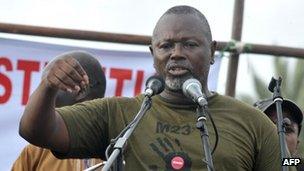Senegal opposition activist Alioune Tine freed
- Published

Prominent Senegalese activist Alioune Tine has been released without charge after two days in detention, as the opposition plans more protests.
Mr Tine is a member of the June 23 Movement (M23), formed last year to oppose President Abdoulaye Wade's plans to run for a third term.
Two people were shot dead on Monday in Podor town during protests after a court ruled Mr Wade's bid was legal.
The M23 say they intend to march on the presidential palace in the capital.
Elections in the West African country - often held up as one of Africa's model democracies - are due on 26 February.
Autopsies
The BBC's Abdourahmane Dia in the capital, Dakar, says there are fears Tuesday's demonstration could degenerate into violence as it has not been authorised.
But the opposition says it has a constitutional right to hold mass rallies across the country.
Our reporter says the bodies of two demonstrators killed in the northern town of Podor on Monday have been sent to Dakar for autopsies.
An eyewitness in Podor told Amnesty International that the police opened fire on an anti-Wade demonstration in the town.
"We were walking peacefully when suddenly security forces dressed in blue and belonging to the gendarmerie fired at the marchers with live bullets. People fell in front of me," the witness said.
After his release, Mr Tine told the AFP news agency that police had asked him "many questions on the demonstrations" planned by M23.
The director of Amnesty International in Senegal called for restraint from both sides on Tuesday.
"We are calling to the government to allow people to demonstrate peacefully. We are also calling to demonstrators to really be responsible of any kind of trouble that may arise from these demonstrations," Seydi Gassama told the BBC's World Today programme.
"We have to make sure their followers are informed, that this right doesn't mean that they can attack security forces, throw stones, because it is this kind of behaviour that is the basis of police repression," he said.
Senegal's constitution has a two-term limit but the constitutional court has ruled this does not include Mr Wade's first term, which began before the clause was adopted.
At the same time as allowing Mr Wade to stand, the court ruled singer Youssou N'Dour and two other opposition candidates could not run.
The move has come in for international criticism.
"We are concerned that the decision by President Wade to seek a third term... could jeopardise the decades-long record that Senegal has built up on the continent for democracy, democratic development and political stability," Reuters news agency quotes US Deputy Secretary of State William Burns as saying.
France, the former colonial power, regretted that not all political viewpoints would be represented in the forthcoming elections, its foreign ministry said.
Opposition parties and activists have called for "national resistance" against Mr Wade's third-term bid.
Once a veteran opposition leader himself, Mr Wade was first elected in 2000 - ending 40 years of rule by the Socialist Party.
- Published5 January 2012
- Published2 April